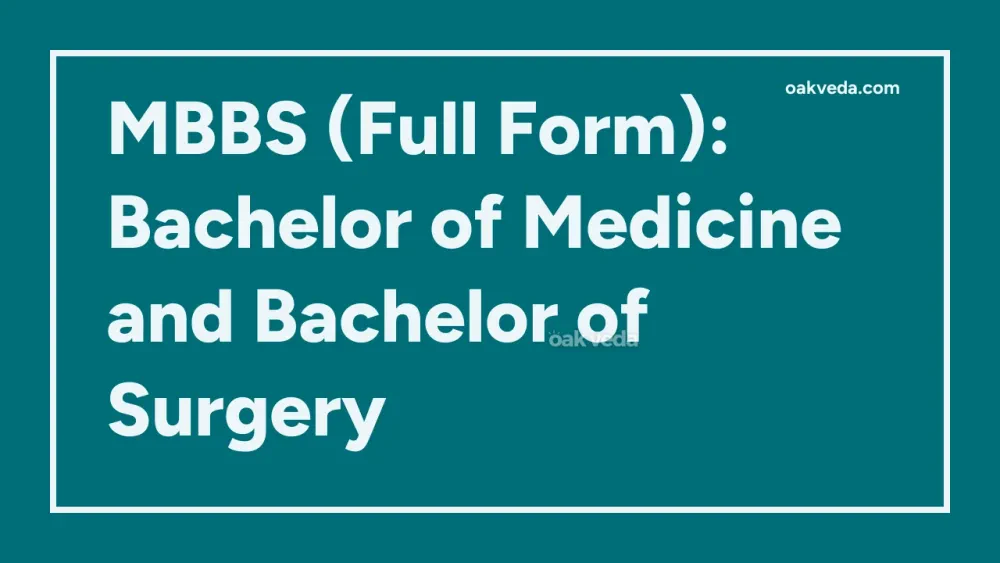
What is the Full Form of MBBS?
MBBS is the full form of Bachelor of Medicine and Bachelor of Surgery. This prestigious degree is awarded to students who successfully complete an undergraduate program in medical and surgical sciences. MBBS is recognized globally as the foundation for a career in medicine and is the first step towards becoming a licensed medical practitioner.
What is Bachelor of Medicine and Bachelor of Surgery?
Bachelor of Medicine and Bachelor of Surgery is a comprehensive undergraduate medical program that combines theoretical knowledge with practical skills in both medicine and surgery. Despite its name suggesting two separate degrees, MBBS is a single integrated course that prepares students for a career in healthcare.
The program typically spans 5.5 to 6 years, including a mandatory internship period. It covers a wide range of subjects, including anatomy, physiology, biochemistry, pathology, pharmacology, microbiology, and clinical disciplines such as internal medicine, surgery, pediatrics, and obstetrics & gynecology.
Origin and Development of MBBS
The MBBS degree has its roots in the British medical education system. It was introduced in India during the colonial era and has since evolved to meet the changing needs of medical practice and advancements in healthcare. Today, the Medical Council of India (MCI) regulates MBBS education across the country, ensuring standardized curriculum and quality of medical education.
How does MBBS work?
The MBBS program is designed to provide a solid foundation in medical sciences and clinical practice. The curriculum is divided into three main phases:
- Pre-clinical phase (1.5 years): Focuses on basic medical sciences
- Para-clinical phase (1.5 years): Introduces clinical subjects and laboratory work
- Clinical phase (2 years): Involves hands-on training in hospitals and healthcare settings
Following these phases, students complete a mandatory internship lasting one year, where they gain practical experience in various medical departments.
Functions of MBBS
The primary functions of the MBBS program are:
- To impart comprehensive medical knowledge
- To develop clinical skills and decision-making abilities
- To instill ethical practices and professional behavior
- To prepare students for further specialization in various medical fields
Applications of MBBS
MBBS graduates can pursue various career paths, including:
- General practice
- Specialization in various medical fields through postgraduate studies
- Medical research
- Public health and administration
- Medical education
Features of MBBS
Key features of the MBBS program include:
- Rigorous theoretical and practical training
- Exposure to diverse medical cases and scenarios
- Development of critical thinking and problem-solving skills
- Emphasis on ethical medical practice and patient care
- Opportunities for research and innovation in healthcare
Benefits of MBBS
Pursuing an MBBS degree offers several benefits:
- Respected and stable career in healthcare
- Opportunity to make a significant impact on people's lives
- Continuous learning and professional growth
- Diverse career options and specialization opportunities
- Global recognition and potential for international practice
Limitations or Challenges of MBBS
While MBBS is a rewarding career path, it comes with certain challenges:
- Rigorous and time-consuming study program
- High-stress work environment
- Long working hours, especially during internships and residency
- Continuous need for updating knowledge and skills
- Emotional toll of dealing with critical patient situations
Future Developments in MBBS Education
The field of medical education is constantly evolving. Some future developments in MBBS education may include:
- Integration of artificial intelligence and digital health technologies in the curriculum
- Emphasis on telemedicine and remote healthcare delivery
- Focus on personalized medicine and genomics
- Increased importance of interdisciplinary approaches in healthcare
- Greater emphasis on mental health and holistic patient care
FAQs on MBBS Full Form
1. What is the eligibility criteria for MBBS in India?
To be eligible for MBBS in India, candidates must:
- Pass 10+2 or equivalent exam with Physics, Chemistry, Biology, and English
- Score a minimum of 50% marks (40% for reserved categories) in qualifying exams
- Be at least 17 years old at the time of admission
- Qualify the National Eligibility cum Entrance Test (NEET)
2. Why is NEET important for MBBS admission?
NEET (National Eligibility cum Entrance Test) is the single national-level entrance exam for admission to MBBS and BDS programs in India. It ensures a standardized selection process across all medical colleges in the country.
3. What are the top medical colleges for MBBS in India?
Some of the top medical colleges in India for MBBS include:
- All India Institute of Medical Sciences (AIIMS), Delhi
- Christian Medical College, Vellore
- Armed Forces Medical College, Pune
- Maulana Azad Medical College, Delhi
- King George's Medical University, Lucknow
4. Can MBBS graduates practice medicine immediately after completing the course?
After completing MBBS, graduates must register with the State Medical Council to obtain a license to practice medicine. Some states may require additional exams or internships before granting a full license.
5. What are the career prospects after MBBS?
MBBS graduates can pursue various career paths, including:
- Clinical practice as general physicians
- Specialization through postgraduate studies (MD/MS)
- Research and academics
- Public health and administration
- Medical writing and journalism
In conclusion, the MBBS full form - Bachelor of Medicine and Bachelor of Surgery - represents a comprehensive medical education program that prepares students for a rewarding career in healthcare. With its rigorous curriculum, practical training, and diverse career opportunities, MBBS continues to be one of the most sought-after professional degrees in India and around the world.
You may be interested in:
- AML (Acute Myeloid Leukemia): Full Form Explained
- NPA (Non-Performing Assets): Full Form and Meaning
- SOP (Standard Operating Procedure) Full Form
- ACD (Automatic Call Distributor) Full Form
- HTML (Hypertext Markup Language): Full Form Explained
- MSME (Full Form): Ministry of Micro, Small and Medium Enterprises

